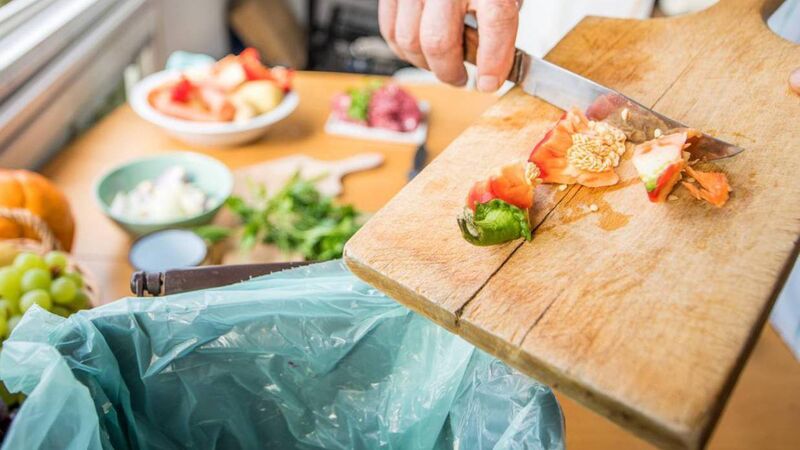Mountains of food waste are eating into business profits

IN THE BIN: A hotel manager told how a food waste audit revealed the venue was throwing out €250,000 worth of food a year
I’m quite selective at a hotel breakfast buffet, only choosing what I’ll definitely eat, but faced with a delectable display of buffet desserts, my eyes can often be bigger than my belly.
There was a lot of talk of waste in our house last week, plastic bottle waste, because of the introduction of the new deposit return scheme, and food waste. My husband attended Cork City Council’s Waste Not, Want Not conference and came home full of stories about efforts to reduce food waste in the local tourism and hospitality sector.
We’ve heard the statistics about food waste in Ireland before. Around 120kg of food waste per household is costing us €700 a year, or nationally €1.29 billion. But, in the context of hotels and restaurants, the volume and numbers are truly eye-watering, not mouth-watering.
From a business point of view, it’s a complete no-brainer to find a new way of running the hotel’s kitchen to stop that waste.
There are environmental reasons (Ireland has a target to reduce food waste by 50% by 2030) and there’s the moral one. That level of food waste is what my granny would have described as “sinful”.
Another example of a hotel bin that was full of hundreds of sausages at the end of every week illustrated how easy the fix can be. The chefs simply didn’t know that the sausages weren’t being eaten because the bins were located away from the cooking area and waitstaff were clearing plates without feeding back to the kitchen the volume of uneaten sausages.
Apparently, it was a heartening conference because so many people are really working hard to address the food waste problem, even to the point of installing cameras on food bins to track what is being wasted. Heartening also because solutions don’t necessarily require money or massive investment, just increased awareness, imaginative work-arounds, and a commitment to tackle the problem. An extra €250,000 in your business account at the end of the year is very motivating!

Talk of plastic bottle waste dominated the airwaves last week, with consumers and retailers giving their two cents on whether the deposit return scheme was a fantastic new environmentally friendly idea or a complete waste of time and money.
Again, the numbers would bring a tear to your eye. Not in a good way.
Global research shows that a deposit returns scheme is a proven way of mopping up bottles for recycling.
On Liveline, the owner of Kavanagh’s service station in Urlingford in Co. Kilkenny, a popular midway stopping point for travellers between Cork and Dublin, spoke to Joe Duffy about the “astronomical” volumes of rubbish that they contend with. Their customers stop to refuel but also offload rubbish from their cars and every week the business has an 1,100-litre wheelie bin full of bottles and cans.
Even though reverse vending machines (RVM) cost €11,000 each, because of the grants available Kavanagh’s owner is delighted to be getting 2.2c for every bottle they accept, and sees the new scheme as a positive waste management solution for her business.
Not all callers to the RTÉ radio show were convinced. One not so diplomatic person said anyone who buys bottled water is an “idiot” and bottled drinks should be taxed out of existence, while another suggested every household in the country should get a new pink bin to recycle these products, rather than having to traipse them back to the shops for a refund.
Of course, schemes like these are old news in many European countries. Twenty countries around Europe have some version of a deposit scheme. Ireland is late to the party.
Germany introduced its version, called ‘Pfand’, back in 2003 for glass and plastic bottles, and captures 99% of single use and refillable and reusable bottles.
Now, in Ireland, a 500ml bottle of cola, lemonade or fizzy orange will cost an extra 25c, and when you are finished, you’ll have to rinse it, leave it in its original shape (don’t squash it!) and bring it back to a reverse vending machine.
Plastic, steel, or aluminium containers up to 500ml will have a 15c deposit built in.
With all the discussion about how the system is going to work and if it would be effective, it seemed clear that the real solution is for all of us to give up soft drinks.
Weight gain, obesity, type 2 diabetes, heart disease, kidney diseases, non-alcoholic liver disease and tooth decay are health risks associated with sugar-sweetened beverage consumption.
If we collectively gave them up, not only would we save the hassle of recycling, but we’d reduce the health risks associated with them.
The best result of our new deposit return scheme will be if it encourages us to avoid buying plastic bottles of soft drinks entirely!







 App?
App?




